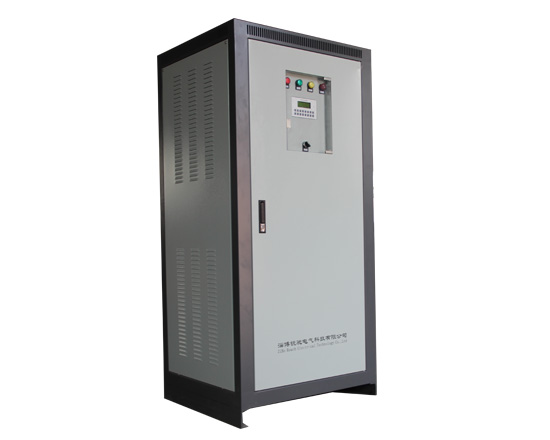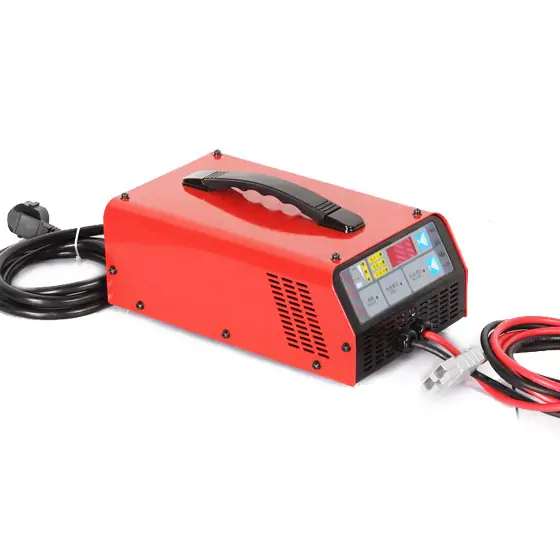In the world of material handling and logistics, forklifts are critical workhorses that require reliable and efficient charging solutions. High-frequency industrial forklift charger have revolutionized the charging process by offering numerous advantages over traditional chargers. In this article, we will explore the features and benefits of high-frequency industrial forklift chargers, shedding light on how they enhance efficiency, performance, and overall productivity in industrial operations.
Understanding High-Frequency Chargers:
High-frequency industrial forklift chargers are characterized by their ability to operate at significantly higher frequencies than traditional chargers. While traditional chargers typically operate at a frequency of 50 or 60 Hz, high-frequency chargers can operate at frequencies ranging from 5 kHz to 100 kHz or even higher. This higher frequency enables them to deliver power more efficiently and with greater precision.
Enhanced Charging Efficiency:
One of the key advantages of high-frequency industrial forklift charger is their enhanced charging efficiency. The higher frequency allows for faster and more precise charging, reducing the overall charging time compared to traditional chargers. This efficiency improvement is particularly beneficial in operations where quick turnaround times are crucial, minimizing downtime and maximizing productivity.
Moreover, high-frequency chargers have improved power factor correction (PFC) capabilities. They draw power from the electrical grid more effectively, reducing reactive power and ensuring a power factor close to unity. This not only improves energy utilization but also reduces strain on the electrical infrastructure and leads to cost savings in terms of utility bills.

Reduced Energy Consumption and Operating Costs:
The efficient operation of high-frequency industrial forklift chargers translates into reduced energy consumption. Their higher charging efficiency results in lower energy losses during the charging process, contributing to significant energy savings over time. By optimizing energy usage, businesses can reduce their environmental footprint and lower their operating costs simultaneously.
Additionally, high-frequency chargers often incorporate advanced power management features such as peak shaving and load balancing. These features intelligently distribute power and manage charging cycles based on the available electrical capacity, avoiding peak demand charges and optimizing energy usage during different times of the day.
Advanced Charging Algorithms and Monitoring:
High-frequency industrial forklift chargers typically come equipped with advanced charging algorithms and monitoring capabilities. These algorithms ensure precise charging control, adjusting charging parameters based on the battery's condition, temperature, and state of charge. This prevents overcharging, undercharging, and thermal runaway, all of which can negatively impact battery performance and lifespan.
The monitoring capabilities of high-frequency chargers allow for real-time data collection and analysis. Operators can track charging parameters, battery health, and historical trends, enabling better decision-making and proactive maintenance. Early identification of battery faults or anomalies can prevent costly breakdowns, optimize maintenance schedules, and extend battery life.
Compact Design and Space Optimization:
High-frequency industrial forklift chargers are known for their compact and lightweight design. Unlike traditional chargers, which tend to be bulky and require more floor space, high-frequency chargers occupy less space, making them ideal for operations with limited space availability. This compact design also facilitates easy integration into existing infrastructure, allowing for seamless implementation and minimizing installation costs.

Compatibility with Modern Battery Technologies:
Modern battery technologies, such as lithium-ion (Li-ion), are gaining popularity in the forklift industry due to their superior performance and longer lifespan. High-frequency industrial forklift chargers are well-suited for these advanced battery chemistries. They offer compatibility with a wide range of battery types and chemistries, including Li-ion, lead-acid, and more. This versatility allows businesses to transition to newer battery technologies without the need for additional charger investments.
Conclusion:
High-frequency industrial forklift chargers have emerged as game-changers in the material handling industry. Their enhanced charging efficiency, reduced energy consumption, advanced charging algorithms, and compatibility with modern battery technologies make them a compelling choice for optimizing efficiency and performance. By investing in high-frequency chargers, businesses can reduce downtime, enhance productivity, lower operating costs, and future-proof their operations. As technology continues to evolve, high-frequency chargers are poised to play a vital role in powering the material handling industry towards a more efficient and sustainable future.
Next:Best Forklift Charger Recommendations
Previous:Forklift Charger Maintenance: Ensuring Reliability and Longevity
Contact Person: Miss. Kiki
| WhatsApp : | +8617763224709 |
|---|---|
| Skype : | +8617763224709 |
| WeChat : | +8617763224709 |
| Email : | kiki@lifepo4-battery.com |